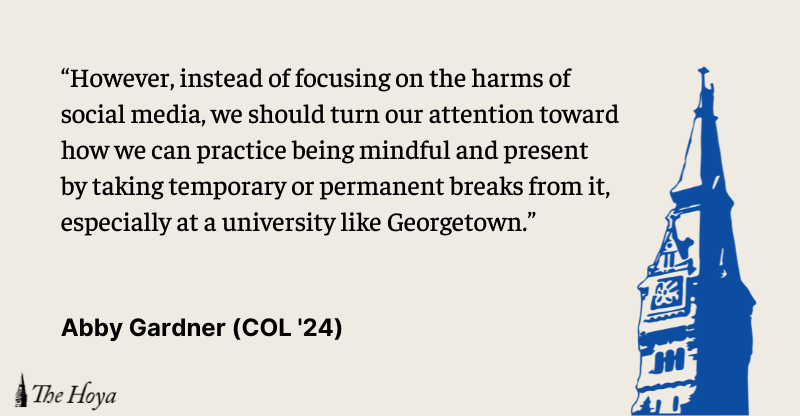I’m a 20-year-old who does not use social media in 2022.
“What are you, a serial killer?” That’s a very common response to this revelation when I tell my peers. You can’t find me on Instagram, Snapchat, Twitter, TikTok, Facebook or even LinkedIn. To answer that question — no, I am not a serial killer. My conscious decision to stay off of social media is somewhat more complex than disguising illicit behaviors, or just wanting to unplug from the perniciousness of the internet.
Social media’s toxicity is notorious, but despite the conversations I have with friends and family about its negative effects, our complaints do not typically lead to any action. As with many modern vices, we generally seem to be okay with the consequences of social media on our mental health because of the ways it allows us to connect with others and build community.
Social platforms themselves are not inherently bad, but when misused, they can fuel mental health problems including depression, anxiety, body dysmorphia and stress. These are some of the most frequent talking points in favor of taking social media breaks or cleanses, and they do hold some weight. However, instead of focusing on the harms of social media, we should turn our attention toward how we can practice being mindful and present by taking temporary or permanent breaks from it, especially at a university like Georgetown where overextending oneself with schoolwork, extracurriculars, jobs, and a social life is the norm.
I first chose to delete my social media accounts in 2018, when I realized it was actively taking away my joy and interfering with my well-being. It was extremely grounding to break away from an online identity that felt forced, and for the most part, it has only benefitted me and helped me grow in ways I otherwise would not have.
Not being able to look someone up before I meet them in person means that I don’t have any preconceived notions about who they are. I find that this is helpful in building more authentic relationships, as first impressions are not based off of a curated highlight reel, but a genuine human-to-human connection.
Furthermore, keeping up with the people in my life has become much more intentional and important since I deleted my social media accounts. If I want to check in on an old friend, I must reach out to them directly, over text or on the phone, or by arranging to see them in person. Our updates become more intimate and meaningful, as they exist between two presently engaged individuals as opposed to the hundreds or thousands of people who see a post.
Entering Georgetown without social media was indeed daunting. While I did post on the class of 2024 Facebook group during my senior year of high school, by the time I came to campus in Aug. 2021, I had officially been off all social media platforms for over a year. Not using these platforms during the pandemic, especially during a completely online freshman year, meant that it was really difficult to meet people and form relationships until we were able to meet one another in person.
I definitely had to go more out of my way to introduce myself to people, which was somewhat nerve-wracking, but ultimately rewarding. My time spent off of social media was extremely beneficial to my mental health and helped me develop a greater sense of self that allowed me to become more confident in forging connections. It resulted in many unexpected friendships with people who were unbothered by the fact that I could not add them on Snapchat or follow them on Instagram. We bonded over mutual interests and the universally isolating experiences of the pandemic. I felt that my connections with others were more sincere than they may have been otherwise, especially because of the fact that nurturing them into relationships needed to be more deliberate.
The most wonderful aspect of my freedom from social media at Georgetown, though, is more deliberately taking the time to notice how beautiful the trees look when their leaves are changing, how excited a fellow Hoya gets when Jack the Bulldog makes an appearance on the front lawn and how beautiful the songs played by a friend sound when I’m not rushing to share them with the world. I get to keep these moments for myself and appreciate them in their totality.
I am not trying to preach social media abstinence to those who value their relationships with various platforms. While I’ve removed it from my own life, I recognize that, in 2022, social media dominates modern communication, entertainment and commerce.
I am, however, trying to encourage the campus community to step back and enjoy being with one another in our fantastic city. In my experience, it seems that we become disconnected with one another as a result of the added pressure of social media, contrary to its ambition of bringing people together. I believe that if more Georgetown students practice intentionality with their social media usage, there will be a greater sense of togetherness all around. Whatever being present looks like for you, allow yourself the time today to be selfish and keep a moment for yourself.
Abby Gardner is a junior in the College.














